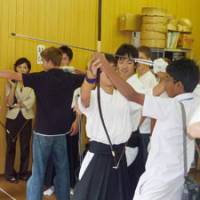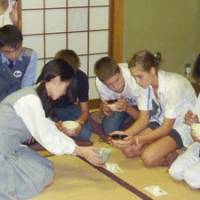A total of 35 junior high school students from nine countries, including India, Malaysia and Hungary visited schools in Kanagawa and Niigata prefectures last month as part of an exchange program to promote cultural understanding.
The exchange program was organized by the Hakuho Foundation, an affiliate of the major ad agency Hakuhodo Inc. and supported by the Japan Foundation, the Japan International Cooperation Agency and others. It was the third of the program originally launched in 2007.
Toshikazu Tani, event planning and promotion manager of the foundation, said the program aims to give Japanese youths opportunities to deepen their understanding of their own country and know more about other countries through exchanges with foreign students. It also aims to help foreign students studying Japanese to understand the people, language and culture of Japan through the visit, he said.
"We aim at very young people who have lots of opportunities ahead of them" and so the age of the participating children is limited to between 12 and 15, he said.
The exchange program, "Hakuho Scheme for a Global Children's Japanese Language Network," also includes a training program in Japan for foreign teachers who teach Japanese in their own countries.
It also sends Japanese students — from the schools that host the visiting foreign students — to overseas schools for similar exchanges. It has also created a community website where the Japanese and foreign participants can communicate with one another.
Prior to the visit of the foreign students in September, eight students from Toko Gakuen Junior High School in Kawasaki and Ojiya Junior High School in Ojiya, Niigata Prefecture, traveled to Malaysia for exchanges with local students.
The nine-day program in Japan for the foreign students consisted of discussing a theme set up by the foundation, sightseeing in Tokyo, taking part in a one-day excursion, attending school classes and club activities at the host schools, as well as home stays at the Japanese students' homes.
The students were divided into two teams, with 21 of the 35 students visiting Toko Gakuen while the remaining 14 visited Ojiya Junior High. On the last day, all 35 gathered in Chiba to give a presentation on the topic they discussed in Japanese throughout their stay.
This year, the theme set up by the foundation was the relationship between human beings and other living species. The students were divided into eight groups and were assigned different topics that were related to biodiversity — the topic of a major United Nations conference taking place this month in Nagoya.
Ayata Tatsuno, 13, a first-year student at Toko Gakuen who had earlier visited Malaysia and held discussions with Malaysian students during the latest part of the program, said it was a good experience for him to talk in person with the students and discover their way of thinking. He said it was especially interesting to find out that the Malaysians wanted to protect the endangered species of tapirs on the Malay Peninsula.
"It was a surprise for me to find out that the Japanese word 'baku' (tapir) is originally Chinese," he said. "It was something that I would have never found out if I hadn't gone to Malaysia and just stayed in Japan."
Tsubasa Baba, 15, a third-year student at Toko Gakuen who also visited Malaysia this summer, commented that he found Malaysian students very friendly and outgoing. "They would come up to us and ask us to have photos taken with them. I was very tired, so I found it a little irritating at first, but I enjoyed it in the end," he said.
Tatsuno and Baba had both visited Sekolah Menengah Jenis Kebangsaan Katholik school in Malaysia's Petaling Jaya city, and stayed at the home of one of the local students. "The atmosphere of the schools were very different, too, in that there was more freedom in the classroom, the students talked more freely to each other, and the teachers were more tolerant of them," Baba said.
Namrata Vashisht and Neha Agarwal, both 14 and from New Delhi, who are studying beginners-level Japanese at a junior high school in India, attended the "sado" tea ceremony club activity at Toko Gakuen and tasted Japanese sweets and "matcha" ground tea.
"I liked matcha, although I found the taste a little bitter," Neha said, throwing a mint into her mouth to ease the bitterness.




